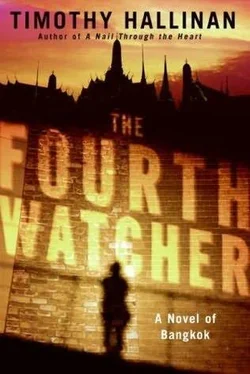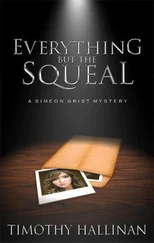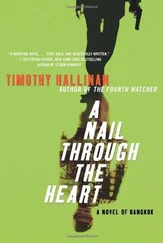Timothy Hallinan - The Fourth Watcher
Здесь есть возможность читать онлайн «Timothy Hallinan - The Fourth Watcher» весь текст электронной книги совершенно бесплатно (целиком полную версию без сокращений). В некоторых случаях можно слушать аудио, скачать через торрент в формате fb2 и присутствует краткое содержание. Жанр: Криминальный детектив, на английском языке. Описание произведения, (предисловие) а так же отзывы посетителей доступны на портале библиотеки ЛибКат.
- Название:The Fourth Watcher
- Автор:
- Жанр:
- Год:неизвестен
- ISBN:нет данных
- Рейтинг книги:4 / 5. Голосов: 1
-
Избранное:Добавить в избранное
- Отзывы:
-
Ваша оценка:
- 80
- 1
- 2
- 3
- 4
- 5
The Fourth Watcher: краткое содержание, описание и аннотация
Предлагаем к чтению аннотацию, описание, краткое содержание или предисловие (зависит от того, что написал сам автор книги «The Fourth Watcher»). Если вы не нашли необходимую информацию о книге — напишите в комментариях, мы постараемся отыскать её.
The Fourth Watcher — читать онлайн бесплатно полную книгу (весь текст) целиком
Ниже представлен текст книги, разбитый по страницам. Система сохранения места последней прочитанной страницы, позволяет с удобством читать онлайн бесплатно книгу «The Fourth Watcher», без необходимости каждый раз заново искать на чём Вы остановились. Поставьте закладку, и сможете в любой момент перейти на страницу, на которой закончили чтение.
Интервал:
Закладка:
Rafferty watches Bangkok ripple through the windshield like a ghost city. “I guess so.”
“We’ll get them,” Arthit says. “Your father is right: One thing at a time.”
“Set up the watchers.”
“Two cops and Ming Li,” Arthit says.
“I still think he might recognize her.”
“He hasn’t seen her since she was ten,” Arthit says. “And even then, your father says he didn’t pay any attention to her.” He cracks the window, gets a faceful of rain, and rolls it up again. He takes another puff in self-defense. “Anyway, half the cops I could pull aren’t as good as she is.”
“She’s a kid.”
“A very smart kid. And there’s one more thing to recommend her: Unlike some cops, we know she’s not on Chu’s payroll.”
“I wish I were certain Leung isn’t.”
Arthit shakes his head. “Doesn’t make sense. If Leung were working with Chu, none of this would be necessary. Your father would be ten feet underwater and halfway to the gulf by now.” He starts the car and slides the lever to kick up the air-conditioning. Then he stares out through the windshield and sighs deeply. “You don’t know this,” he says, “but my father was a cop.”
Rafferty looks over at him. Arthit fiddles with the temperature controls.
“On the take, of course.” Arthit still does not turn to face Poke. The air conditioner seems to require all his attention, and the cigarette burns forgotten in his free hand. “All Thai cops were on the take in those days. He took from everybody. He took money to keep people out of jail. The old one-two-three: Get the case, crack the case, take a bribe. Pimps, thieves, hired muscle. Twice, or at least twice that I know of, a murderer.” The rain kicks up, shaped by a sudden gust of wind into a curtain of faintly colored mist that ripples and curls in front of Rafferty’s eyes like the aurora borealis. “Of course, usually that meant other people went to jail. See, when a cop takes a payoff, the crime doesn’t go away. Somebody’s got to take a fall.”
Poke wants to put an arm around Arthit’s shoulders but is sure it wouldn’t be appreciated. “I know.”
“So the guilty got off and the innocent got screwed,” Arthit says. “That’s what my father did for a living. He did it practically every day. But you know what, Poke? There was always food on the table. My brother and I went to school. I wound up in England, getting a very expensive education paid for by crooks and, I suppose, by the people who were stuck in those cells for things they didn’t do.” He puts his face near the window and exhales a cloud of smoke onto the glass, then wipes it clear with his sleeve. “Because of where my father was, who he was. That was what he had to do to live, to take care of the people he loved. And he did. He took care of all of us.”
Poke says, “I know why Noi married you.”
“Really?” Arthit says. He stubs out the cigarette in the ashtray, so hard that sparks fly. “I wish I did.”
It seems silly at this point not to go home, now that the only things worth protecting have already been taken. So when Arthit heads for the station to line up his two cops, Poke goes back to the apartment.
The place feels immensely empty. When he first rented it, almost three years ago, it seemed like the perfect size for a man on his own. He filled it completely. He had a bedroom, a kitchen, a living room, and an office. He rattled happily from one room to another, doing his work, making his mess, and cleaning it up. He ate at the kitchen counter and drank his morning coffee on the balcony overlooking the Chinese cemetery his landlady had proudly pointed out as the source of the building’s dubiously good feng shui. Never once had it felt too big for him.
Now it seems enormous.
There’s nothing in it anymore that is his alone. His office is Miaow’s room. The bedroom is the secret space he shares with Rose. The living room, the kitchen, all the objects in them-they belong to his family. The pencils have Rose’s tooth marks on them. Miaow’s sneakers have left ghost marks on the carpet. The surface of the sliding glass door has reflected all of them.
Living on that barren acreage in Lancaster, enveloped in his father’s silences, Rafferty grew used to being alone. His mother was affectionate one moment and distant the next. Frank’s attention was thousands of miles away. The solitary child who lived in the space between these adults developed into a solitary man. In many ways he had enjoyed it. Being alone gave him freedom. He did what he wanted, when he wanted. After he discovered Asia, he went where he wanted. A passport and an airline ticket were the only traveling companions he needed. Rafferty persuaded himself gradually that he had chosen to be alone, that this was the life he had created for himself, a life he filled completely. Now, standing in the center of his empty living room, he asks himself whether he could survive being alone again.
He has things to do to prepare for the next day-one thing at a time, as the world keeps reminding him-but first he goes down the hall into Miaow’s room. The cardboard smiley face she drew to mean “Come right in” is hanging on the doorknob, its companion, the frowny face temporarily banished to one of her drawers.
Except for the mussed bed, abandoned in the middle of the night, her room is, as always, immaculate. Her shoes are in a regimentally straight line. There are still times when Miaow sits in the center of the floor, carefully lining up her shoes so she can scatter them and line them up again. For most of her life, she went barefoot.
Drawings in colored pencil are taped to the walls, along with a few older ones in crayon. Here and there he sees a version of the cheerful house below a blue sky and a fat primary-yellow sun that children everywhere draw, but most of the pictures are of the three of them: Rose, preternaturally tall and slender; Rafferty in an ugly T-shirt; and between them-always between them-Miaow, her skin darker than theirs, the part in her hair drawn with a ruler. The wall above the dresser is filled with pictures, but lower and to the left Rafferty spots a brand-new one. He leans down to take a closer look. It shows a lopsided birthday cake, candles gleaming, with three people barely visible in the darkness behind it. In the center of the cake, written in the inevitable pink, is the number 9.
Rafferty lets out more air than he knew he had in him. The cake.
It feels to Rafferty, at that moment, like they had baked that cake and lit those candles months ago. But they had celebrated Rose’s birthday on Friday night, and this is Sunday night. It had been only forty-eight hours.
“I’ll bring you back,” he says to the room. “Both of you. I promise.”
He closes the door behind him gently and goes into the living room to call Peachy.
32
Peachy and Rafferty are watching from a stall four doors away when the two uniformed cops and Elson, looking sharp and mordantly businesslike in his black suit, enter
the building at 8:10 on Monday morning. Peachy is perspiring as anxiously as someone waiting for a firing squad, and Poke carries a wrinkled brown supermarket shopping bag. When she sees Elson, Peachy takes a step back, and Rafferty grabs the sleeve of her blouse to make sure she won’t keep going.
She has already been upstairs once, at 6:15, to open the more daunting of the two locks, so they wait only three minutes-enough, Rafferty is sure, for the cops to pop the easy lock-and then he more or less hauls her through the street door and up the stairs. Rafferty stands to one side and puts an encouraging hand in the small of her back. When Peachy tries to slip her key into the lock, the door swings open.
Читать дальшеИнтервал:
Закладка:
Похожие книги на «The Fourth Watcher»
Представляем Вашему вниманию похожие книги на «The Fourth Watcher» списком для выбора. Мы отобрали схожую по названию и смыслу литературу в надежде предоставить читателям больше вариантов отыскать новые, интересные, ещё непрочитанные произведения.
Обсуждение, отзывы о книге «The Fourth Watcher» и просто собственные мнения читателей. Оставьте ваши комментарии, напишите, что Вы думаете о произведении, его смысле или главных героях. Укажите что конкретно понравилось, а что нет, и почему Вы так считаете.












